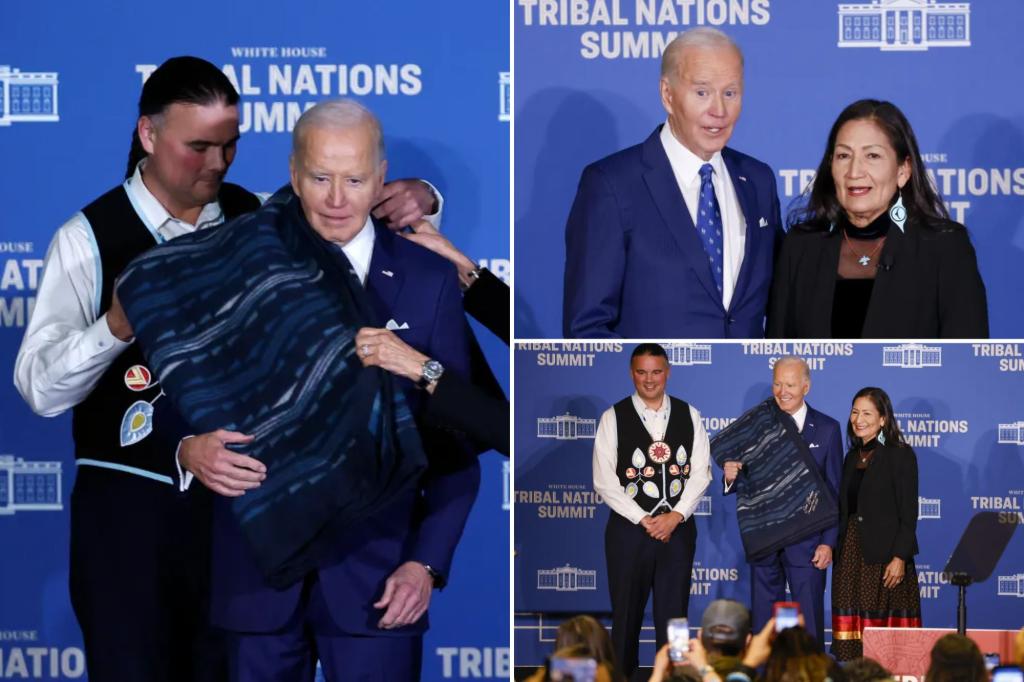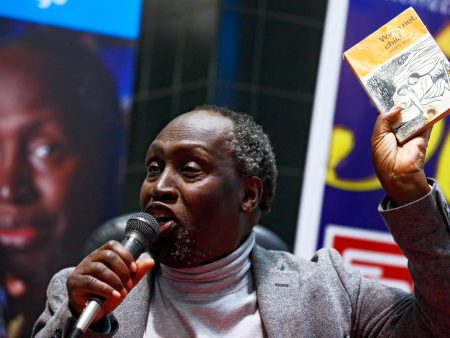President Biden’s fourth and final White House Tribal Nations Summit marked a significant moment in the ongoing dialogue between the US government and Native American communities. The summit, held indoors, provided a platform for the president to address historical injustices and announce new initiatives aimed at healing and reconciliation. A poignant moment unfolded as Interior Secretary Deb Haaland, visibly moved, draped an eighth-generation Native American blanket over the president, a symbolic gesture recognizing the shared heritage and ongoing relationship between the government and tribal nations. Biden, acknowledging the sentimental value of the gift, lightheartedly remarked on its potential utility during the recent frigid White House Christmas Tree Lighting ceremony, a comment that followed online comparisons of his bundled appearance to Dickensian characters.
The central focus of Biden’s address was the Carlisle Federal Indian Boarding School, a grim reminder of the government’s past policies of forced assimilation. Operating between 1879 and 1918, the school separated over 7,800 children from 140 different tribes, stripping them of their cultural identity and severing their ties to their communities. Biden, recognizing the profound impact of this historical trauma, declared the former school site a national monument. Spanning 24.5 acres and encompassing various historic buildings and structures, the monument will be jointly managed by the National Park Service and the US Army. This designation serves not as an attempt to erase history, but rather to acknowledge the painful legacy of these institutions, learn from the past, and ensure that such injustices are never repeated. The monument stands as a testament to the enduring resilience of Native American cultures and a symbol of the nation’s commitment to healing and reconciliation.
The president’s declaration was underscored by his conviction that acknowledging historical wrongs is essential for national healing. He emphasized the importance of remembering these past injustices, not to dwell on them, but to learn from them and prevent their recurrence. The designation of the Carlisle school as a national monument serves as a tangible reminder of this commitment, ensuring that future generations understand the devastating impact of these policies and the importance of respecting and preserving cultural diversity. Biden’s words resonated with the spirit of reconciliation, highlighting the need to move forward while acknowledging the past.
Beyond the monument designation, President Biden unveiled a comprehensive 10-year plan aimed at revitalizing Native American languages. Recognizing the devastating impact of assimilation policies on indigenous languages, the president stressed the importance of preserving these languages as integral parts of the nation’s cultural heritage. This initiative represents a significant commitment to supporting tribal communities in their efforts to reclaim and revitalize their linguistic traditions. The plan emphasizes collaboration with tribes, providing resources for teachers, schools, and community organizations dedicated to language preservation. This “all-of-government strategy” will expand access to immersion programs, support community-led language education, and promote Native language schools and programs.
The revitalization of Native American languages is not merely an academic exercise; it is a crucial step towards cultural preservation and empowerment. Language is inextricably linked to cultural identity, carrying within it the history, traditions, and values of a people. By supporting language revitalization, the government acknowledges the importance of these languages not only for Native American communities but for the nation as a whole. This initiative represents a tangible step towards honoring treaty obligations and fostering a more inclusive and equitable society. The commitment to preserving these languages reflects a broader understanding of the importance of cultural diversity and the richness it brings to the nation’s tapestry.
The Biden-Harris administration has demonstrated a consistent commitment to addressing the needs of Native American communities, investing $45 billion in various programs since 2021. These investments, coupled with policy initiatives like the national monument designation and the language revitalization plan, reflect a broader effort to strengthen the government-to-government relationship with tribal nations. President Biden’s actions at the Tribal Nations Summit, particularly his apology on behalf of the federal government for the historical policy of forced assimilation, signal a renewed commitment to addressing historical injustices and working towards a more just and equitable future for Native American communities. The summit served as a platform to reaffirm the government’s commitment to honoring treaty obligations and respecting tribal sovereignty.










